“At least my babies are together in heaven”: Mum who adopted after losing her triplets at 24 weeks
by Christine Leow // June 9, 2022, 10:00 am
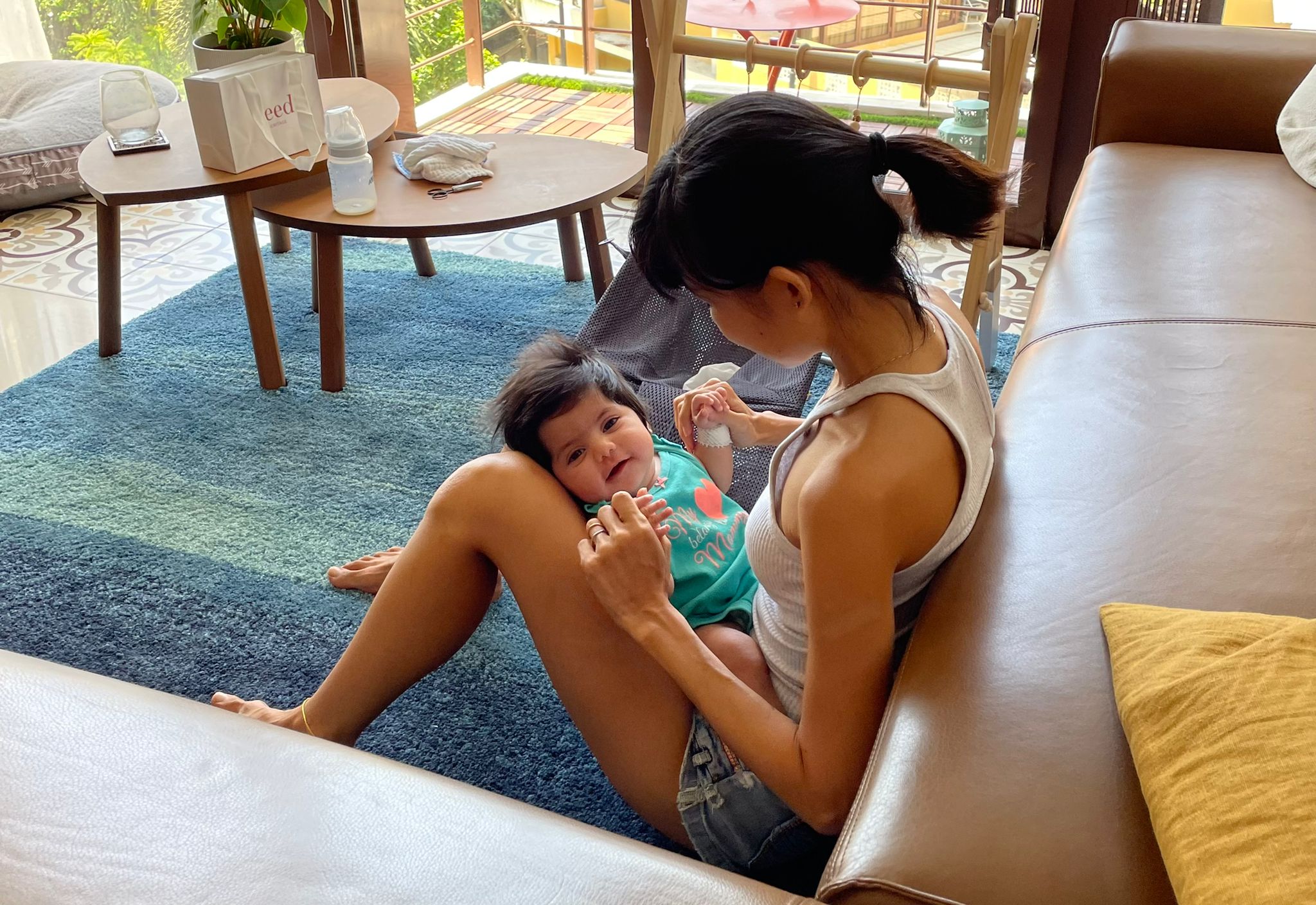
Natalie Tan with baby Hannah. When she lost her triplets and was told that her womb had been severely scarred by an infection, Natalie wondered if she was perhaps not meant to have children. All photos courtesy of Natalie Tan.
When Natalie Tan discovered that she was pregnant, she could hardly believe it.
“It was so surreal,” said the 34-year-old.
“When they called me and told me that I was pregnant, I still felt like me.”
She had always known she would have trouble having children because she had secondary amenorrhea. This meant that she could go for months without having her period.
Additionally, she had battled with an eating disorder during her 20s. “Years of abusing my body meant that I never really had my period.
“I was also put on birth control pills to protect my bones. So, I didn’t have natural periods for a long time.”
Even before Natalie got married, she had told her fiancé, Florian Rennekamp, 38, about her condition when they discussed their future family.
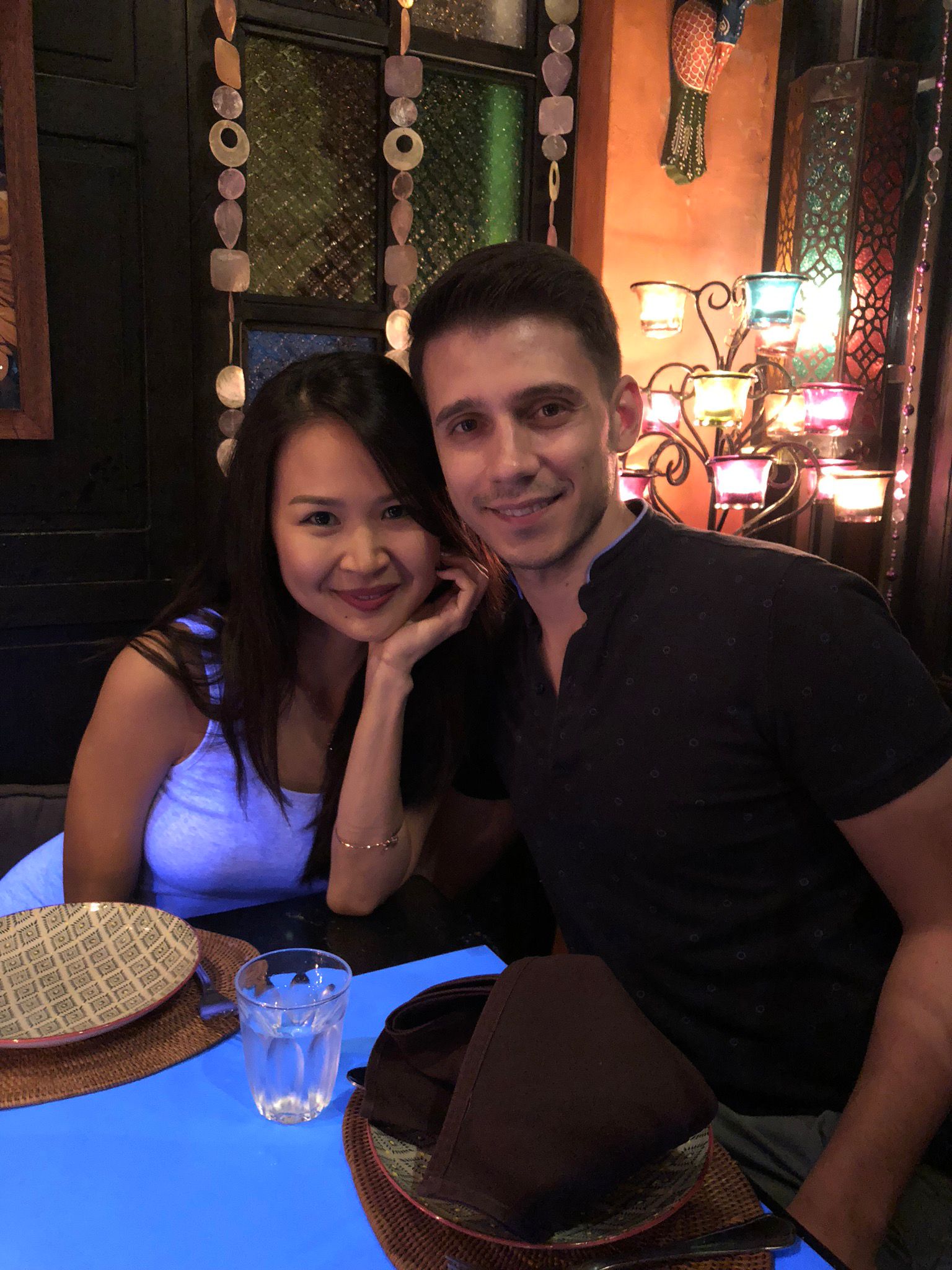
When Natalie and Florian Rennekamp got more serious about their relationship, they started discussing their future family. Adoption was always a real possibility for them even if they could have their own children.
When they tied the knot three years ago, they wasted no time starting on intrauterine insemination (IUI). The procedure involves placing sperm directly into the uterus so that the more healthy sperm can reach the fallopian tubes.
“The doctor said that IUI was less invasive, more natural and more affordable.”
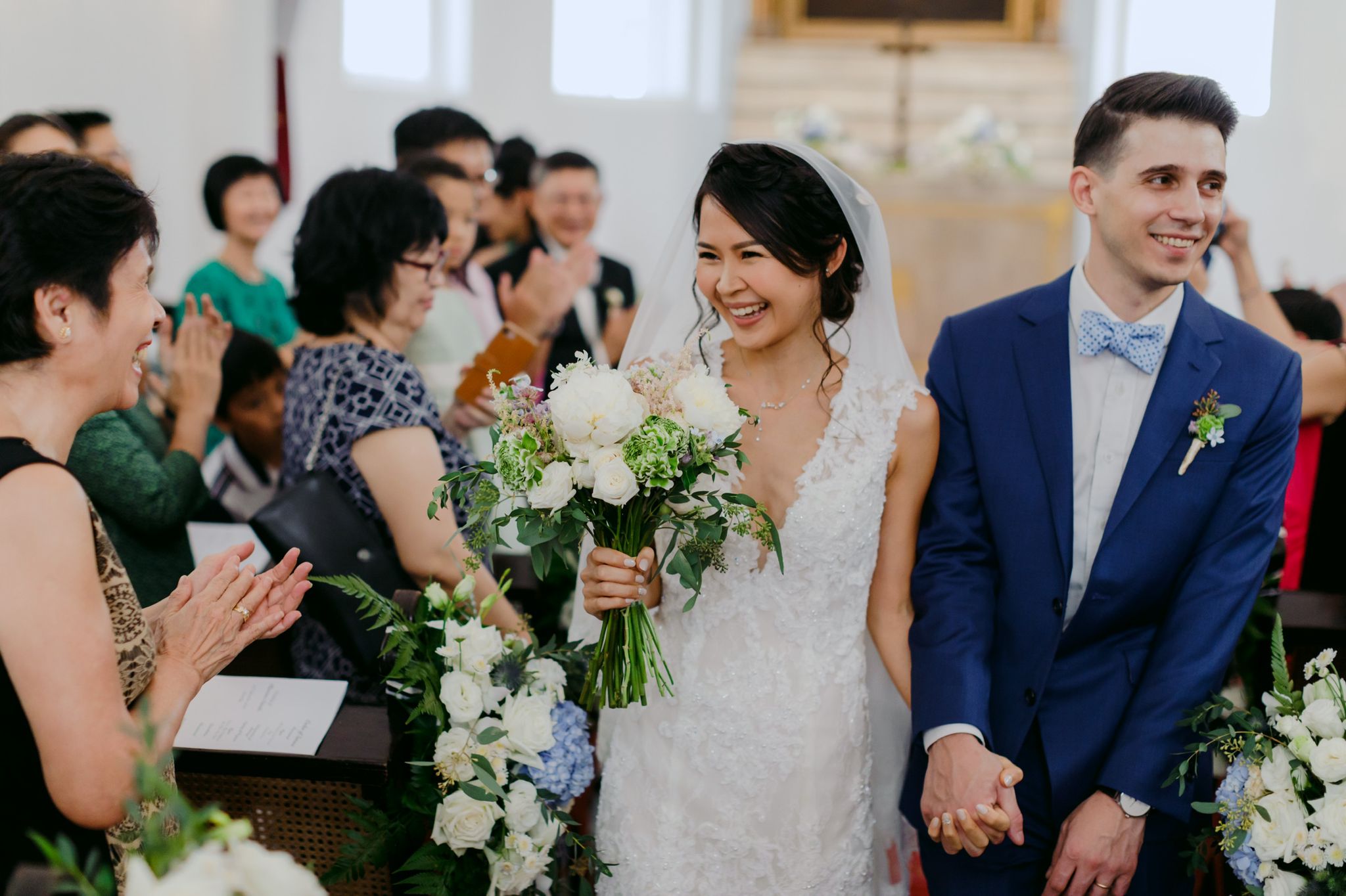
Natalie and Florian began IUI after they got married because they knew she would have trouble conceiving.
On average, couples go through three cycles of IUI to get pregnant. Natalie conceived on the second cycle. “I was cautiously hopeful. There were some symptoms but a lot of it was attributed to the fertility medication.
“When they called me and told me that I was pregnant, I still felt like me; I didn’t feel pregnant.”
“If this is what God has given us, we will take it. Whatever happens, we will accept it.”
There was more good news. At five weeks, she was told she might be carrying twins. A week later, another heartbeat was detected.
“At the ultrasound, they said, ‘One heartbeat here … and another one here.’ Then, she said, ‘The third one is here.’
“We were like, ‘No! You’re joking.’ There was a lot of shock. Seeing them for the first time on the scan was very emotional.”
Though the couple panicked for a bit over the possibility of complications associated with a multiple pregnancy, they soon embraced the idea.
Having gone to church with her parents since she was a child, Natalie had a deep belief in the sovereignty of God in all situations.
“We had been wanting children. If this is what God has given us, we will take it. Whatever happens, we will accept it.”
What they did not expect was to lose their babies six months into the pregnancy.
A heart for hurting children
Natalie had always wanted to be a mother.
“When I was six or seven, thinking about what occupation I wanted, one of them was always being a mother. So, even then …
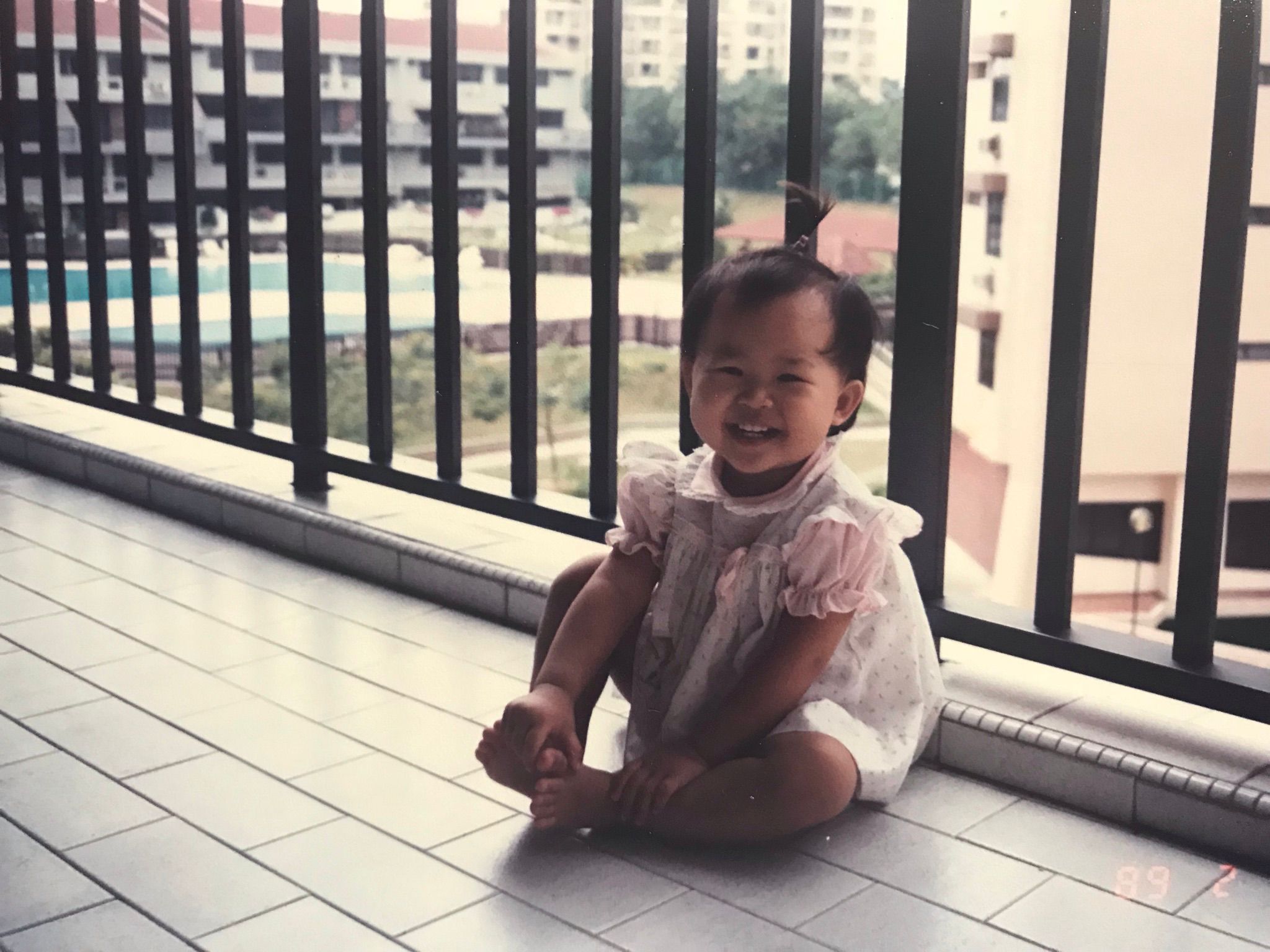
Natalie as a child. Even as young as when she was in primary school, she had always wanted to be a mother.
“I have never been one of those who didn’t want to marry and have kids.”
Natalie attributes this desire to her own mother, who was a stay-home mum, as well as to a childhood surrounded by children.
“From a young age, I was exposed to my cousins. I also used to go with my mum to Assisi Hospice, which had a children’s arm.
“She volunteered there and I would play with the children undergoing chemo. They always brought me so much joy. I just had the maternal instincts to nurture.”
“When I was six or seven, thinking about what occupation I wanted, one of them was always being a mother.”
Her mother volunteered at Grace Haven, too, and young Natalie would tag along from time to time to visit the residential home for children and youths who required care, protection and rehabilitation.
“It sparked feelings in me. The children were lovable even though some had some issues. I harboured a desire to help even then.”
So, when she and Florian became serious about their relationship, they talked about adoption as an option. “We talked about having our own kids and then also adopting on top of having our own.”
It was something upon Florian’s heart as well. Because his paternal grandfather was Indian, he had been to India and had seen the poverty there.
“So, he had in his mind that if he had the capacity to, in the future, he would love to adopt an Indian baby to help out.”
Little did they know that adopting a baby of Indian descent would, indeed, be on the cards in their future.
“I felt very disgusted with myself”
Natalie’s dream of having her own biological children was derailed when she was about 20 years old.
She had always lived a healthy lifestyle, eating well and exercising regularly. “I was pretty happy.”
Within six months or so, Natalie had lost so much weight that her mother convinced her to seek professional help.
Then, what started out as losing just a bit of weight to “see how it goes” became a personal challenge to lose more and more.
“It became an issue of control, losing 2kg, then losing two more. I couldn’t let go of it. It became a crutch for everything.”
But Natalie believes a spiritual attack may have started it all. “I remember the exact moment when it happened: I was at a very dark bus stop when I suddenly felt very disgusted with myself. I felt I had to lose weight.
“I was totally fine and then suddenly I was feeling disgusted with myself. It was like something just came over me. That was the start of everything spiralling.”
Within six months or so, Natalie had lost so much weight that her mother convinced her to seek professional help.
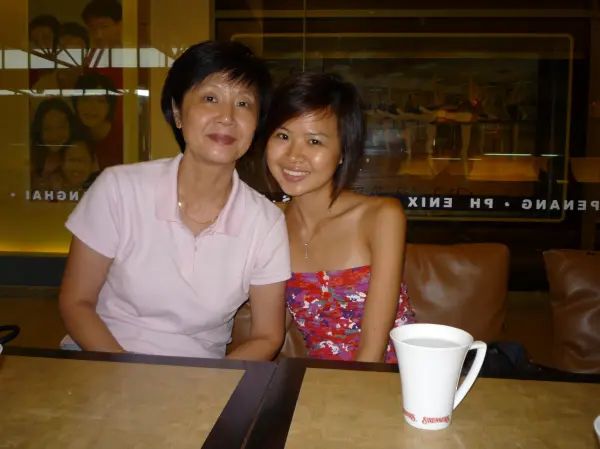
Natalie in her 20s with her mother. It was her mother who convinced her to get professional help for her eating disorder.
“I didn’t think I had such an issue even though I did think something was wrong. In my mind, anorexia meant not eating a single thing. I was still eating bits and pieces.”
Letting go and letting God
Even after she was diagnosed with the eating disorder, Natalie was still in denial.
“Both my parents and I grew very close because of the eating disorder.”
“It took a long time to get better. There were lots of ups and downs. There were periods when I would be better and periods when I would spiral back down.
“At times, when I thought about eating, there would be a voice inside me berating me, ‘You are fat. You eat too much.’ ”
Her mother would pray with her and for her. The aunties in church would also pray for her healing.
“When it got to be an effort, I would go to my mum and ask her to pray with me. Both my parents and I grew very close because of the eating disorder.
“They went through a lot with me. There were a lot of tantrums and battles but they never lost hope in me getting better.”
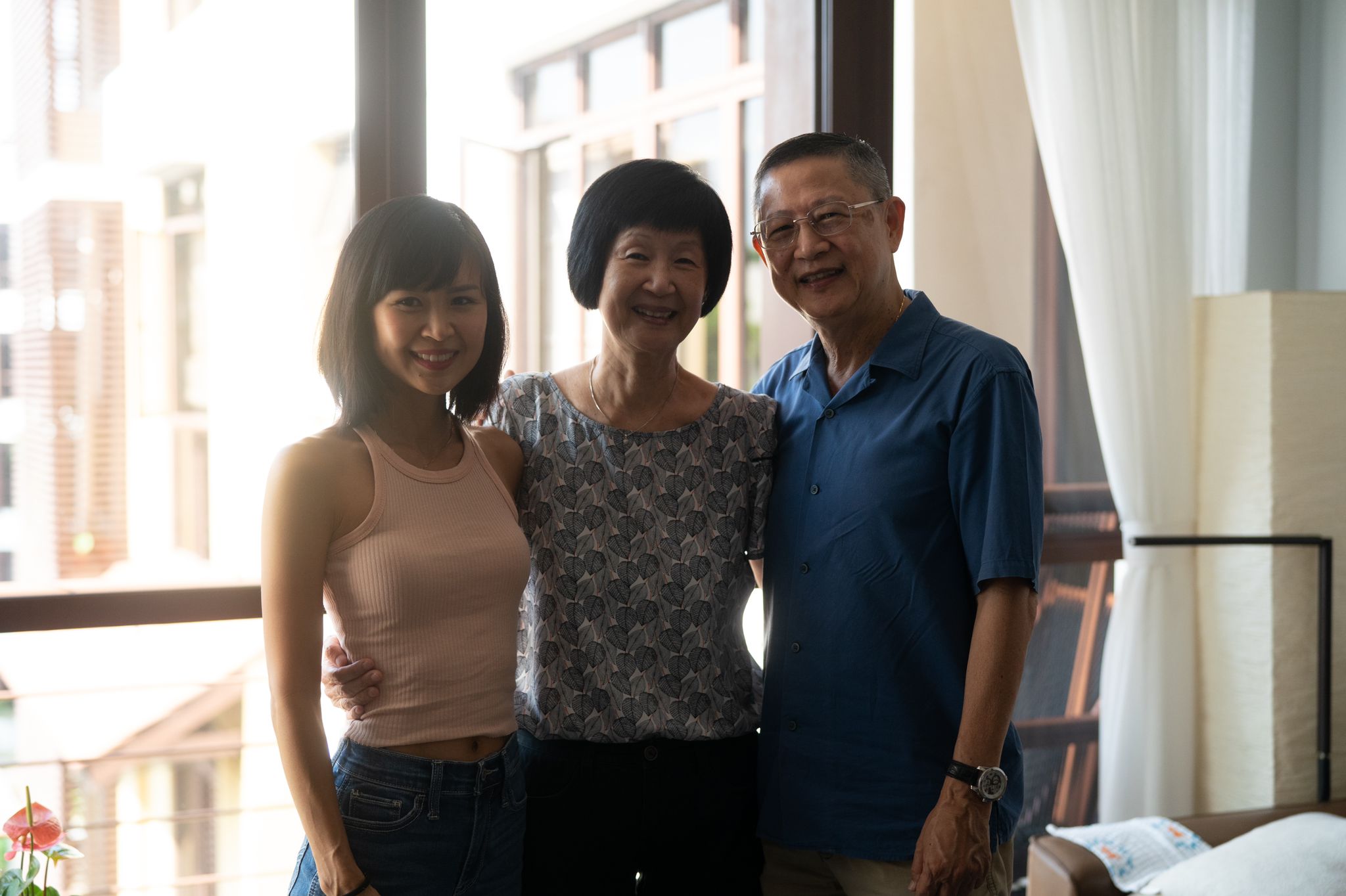
Natalie and her parents drew closer as they helped her overcome her eating disorder.
Upon Natalie’s request, the family would sit down and read the Bible together every morning, and talk about the passage they had read. “It helped me.”
It took nearly six years for Natalie to manage her eating. During that time, she also learnt what it meant to surrender to God.
“I began to understand that I cannot be in control of everything. It is difficult sometimes being human and trying to wait on God and just letting go and saying, ‘I trust You to catch me when I fall.’
“In my mind, in my heart, I knew that God was there. But letting go was still a constant struggle.”
“In my mind, in my heart, I knew that God was there. But letting go was still a constant struggle.”
Natalie also learnt to be kinder to herself and to forgive herself. With that release came a breakthrough.
“As I ate better, I felt happier. When you starve yourself, your brain doesn’t function so well because you are not getting enough nutrients. Eating better helped me to think better.”
The desire not to put her parents through more pain also motivated her to get better, as did her desire for a normal life.
“I didn’t want it to stop me from getting married and having a family.
“And if I had children and I had an eating disorder, I might pass it on to them. Being healthy became more important.”
Week 24
So, when her deep longing to have a family of her own looked well on its way to being fulfilled, Natalie and her husband were over the moon. Save for a little spotting in Week 5, for over five months, everything was normal.
Then just before she reached Week 22 of her pregnancy, Natalie began experiencing a little spotting, then some bleeding. She was hospitalised.
“From then on, the bleeding never really stopped.”
“Rationally, if they were not viable, we would have to let them go. But I couldn’t let them go. I was so upset.”
Her doctor pinned the cause down to an infection so rare he declared that he had “never had this kind of infection in my entire career”. No one knew “how it got there or how or when it started”.
Natalie was given “as much antibiotics as it was safe” to fight the infection. “I had a fever but otherwise I felt pretty okay.”
Then came the difficult news. The doctors told her that, because of the infection, she would likely miscarry her triplets.
The hope was that she could carry them to 24 weeks. Doctors would then be able to give injections to help their lungs develop so that when they were born pre-term, they would have a better chance of survival.
As the couple discussed the possibility that Natalie might miscarry before 24 weeks, she struggled with what it meant to love her children.
“Rationally, if they were not viable, we would have to let them go. Imagine if all three came out with issues because they were too small? It wouldn’t be fair that they couldn’t have a good quality of life.
“But I couldn’t let them go. I told (the doctors), ‘You have to fight for them.’ I was so upset.”
Adam, Emma and Ava
A few days before Natalie crossed the 24-week mark, she felt “something watery coming out”.
She thought her water bag had burst. Instead, the discharge was green and foul-smelling. The infection had progressed into her system and she was turning septic. The doctors told her they had to deliver her triplets or her life would be in danger.
“In my mind, I thought I was fine. I didn’t want to go to the delivery suite.”
Her triplets were perfectly healthy. They had simply been born too soon.
But they wheeled her there to save her life. Her babies were induced and the doctor broke her water bag.
“The first one was a boy. I knew he was coming out because even the day before, I could feel something at the entrance. I could feel him. He came out pretty fast.
“The other two were girls. They took a bit longer because they were higher up. When the second one came out, I could hear her.
“Right after the third one was born, I felt really cold, almost like I was in shock. My teeth were chattering and I passed out.”
When Natalie came to hours later, her babies had passed away. “When I saw them, my first thought was: ‘They are perfect.’
“All three of them were perfect. They looked very peaceful. At least they are together.”
Her triplets were perfectly healthy. They had simply been born too soon. “We named the boy, Adam, and the girls, Emma and Ava.”
They were loved
In the days and weeks that followed, Natalie was overwhelmed with emotion.
“I was angry with God, really angry with God. I questioned Him so much. Why give me three children, then take them away? To give life and take it away seemed really cruel.
“Have I been a bad person that I needed to be punished like that?”
The feelings of inadequacy that had plagued her in the years she struggled with her eating disorder returned.
“There was a lot of feeling very lonely, feeling guilty. Maybe I didn’t deserve to be a mother.”
“There was a lot of feeling very lonely, feeling guilty. Maybe I didn’t deserve to be a mother if I couldn’t bring them as close to full-term as I could.
“Or maybe God didn’t think I would be a good enough mother. There was a lot of blaming myself, feeling angry with myself.”
In the end, Natalie drew comfort from two things. One was the realisation that she grieved so deeply because she loved her babies so immensely.
“We had a lot of wonderful memories with them while they were there. We brought them on our late honeymoon, travelling across Italy and eating lots of good food.
“They were very much loved.”
The other was the hope of seeing them again — a hope that came from her faith in God.
“Knowing that my babies are in heaven also gave me comfort. Maybe they are not here but I will see them again and I will know it’s them.
“I learnt to accept what happened and to just give thanks for the fact that I had them.”
Surrendered desires
In January 2020, five months after she lost her triplets, Natalie and Florian decided to try IUI again. When that failed to result in a pregnancy, they decided to resort to IVF. That was when she was hit with another devastating piece of news.
The infection that had cost her her babies had also scarred her womb.
“The infection got to my womb and ruined it in a way. For most women, the scarring is mild and easily cleared. But because of the infection, the scarring got into all the tissues.
“It felt like one thing after another. Were we not supposed to have kids? That played on my mind a lot.”
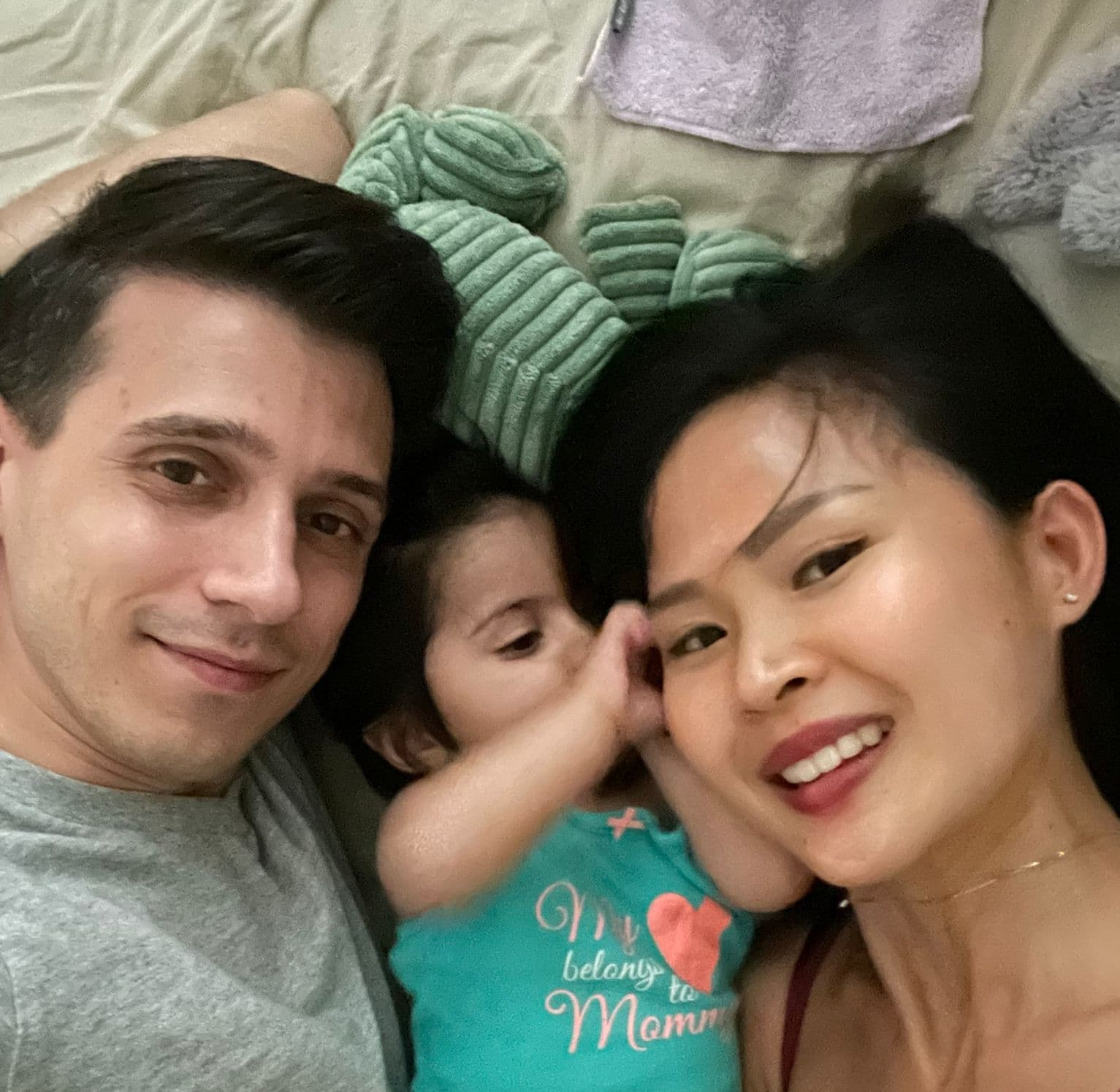
Florian, Hannah and Natalie. For a while, Natalie feared that she would never become a mother.
Natalie, awash with despair, spent many days in tears. At her lowest, she even offered her husband a way out of the relationship.
“I felt for Florian. I remember telling him, ‘You don’t have an issue. You can go out and still have a family that you would like.’
“There were times when I would go and play with my friends’ kids and come home and cry.”
“But he told me, ‘I choose to be with you regardless of whether we have kids or not.’ ”
His commitment fortified her, as did her faith.
“Friends would text me to remind me that God has great and wonderful plans for me (Jeremiah 29:11). Little things like that were like bread crumbs along my journey.
“At the back of my mind, through all the anger I had towards God, I still had a belief in Him that things would work out. I never lost faith. I always believed that God exists and that He loves me.”
So, Natalie learnt, as she had before when she struggled with her eating disorder, to release her need for control and trust God.
“Sitting and waiting are the hardest things to do. It was not a test of patience because I didn’t know when or how or if I would ever have children.
“That was when I began to think about not having children. It was not that I had lost hope about having children. But I learnt to enjoy being with Florian and with my rescue dog, Nala — just being the three of us.
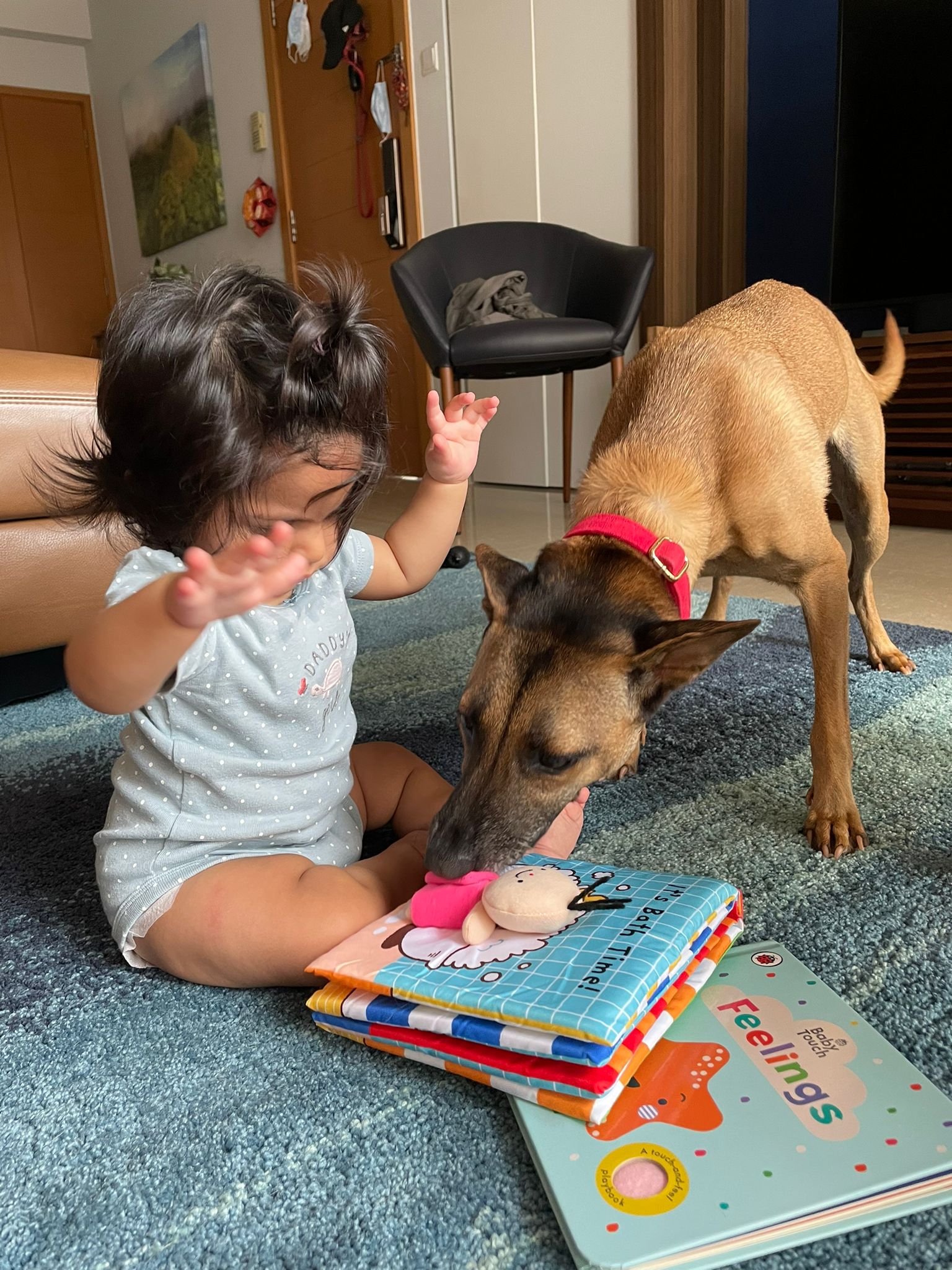
Hannah and the family dog, Nala, are now best pals.
“There were times when I would go and play with my friends’ kids and come home and cry. But on the whole, I could make peace with the fact that a family can also be formed by husband and wife and no children.”
When Natalie finally surrendered her desires, she and Florian decided to do what they had talked about when they were dating – adopt.
Expecting the process to take years, the couple was surprised when they got a call just four months in. A little Indian baby girl had been born and she was in need of a home.
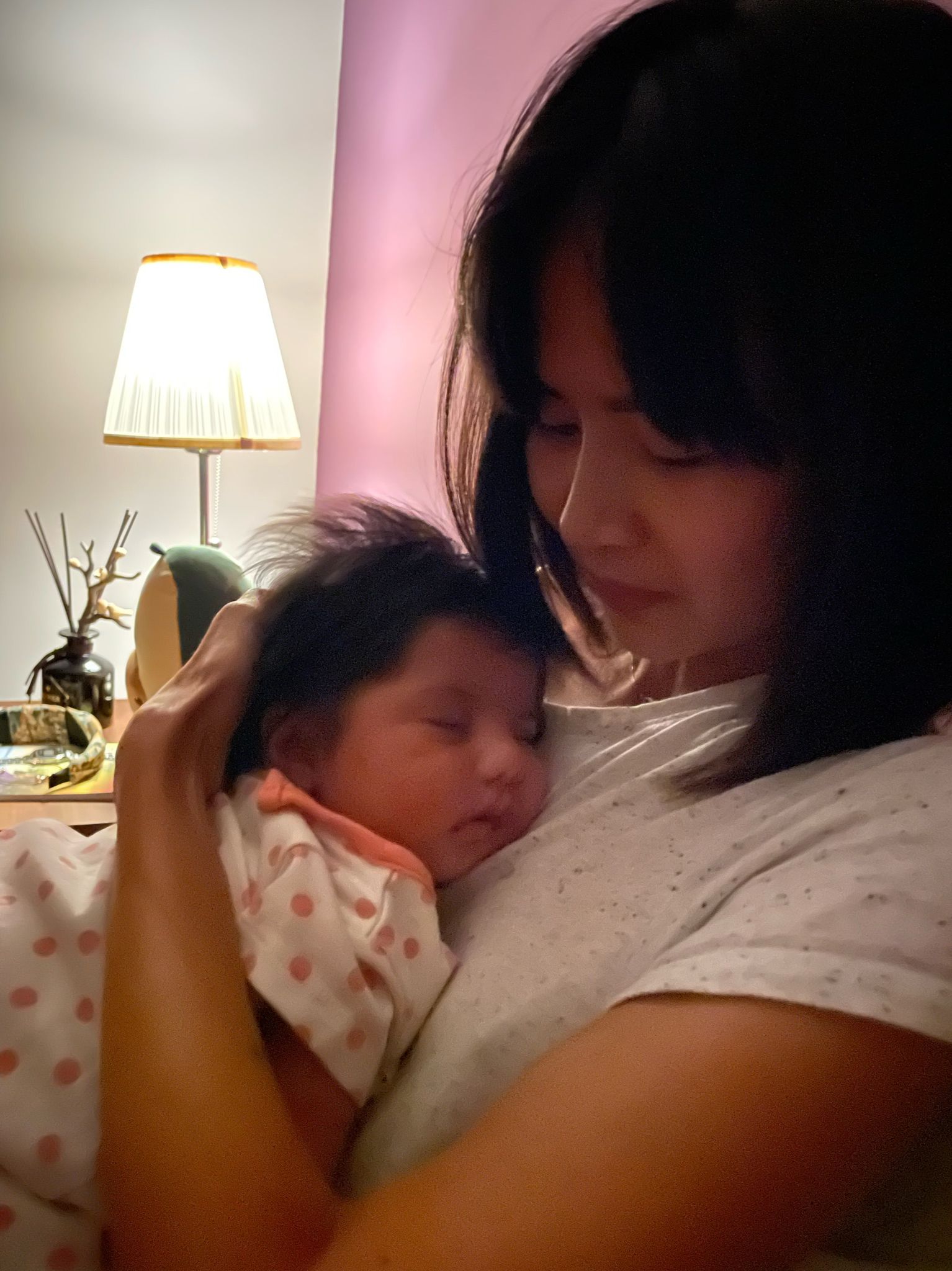
Hannah came into their home at seven weeks old.
Once they decided to adopt her, everything fell into place easily. Within seven weeks, they were able to bring their baby home.
Gains from loss
Their daughter Hannah is nearly 10 months old now and, according to Natalie, she is a happy, easy baby who hardly cries.
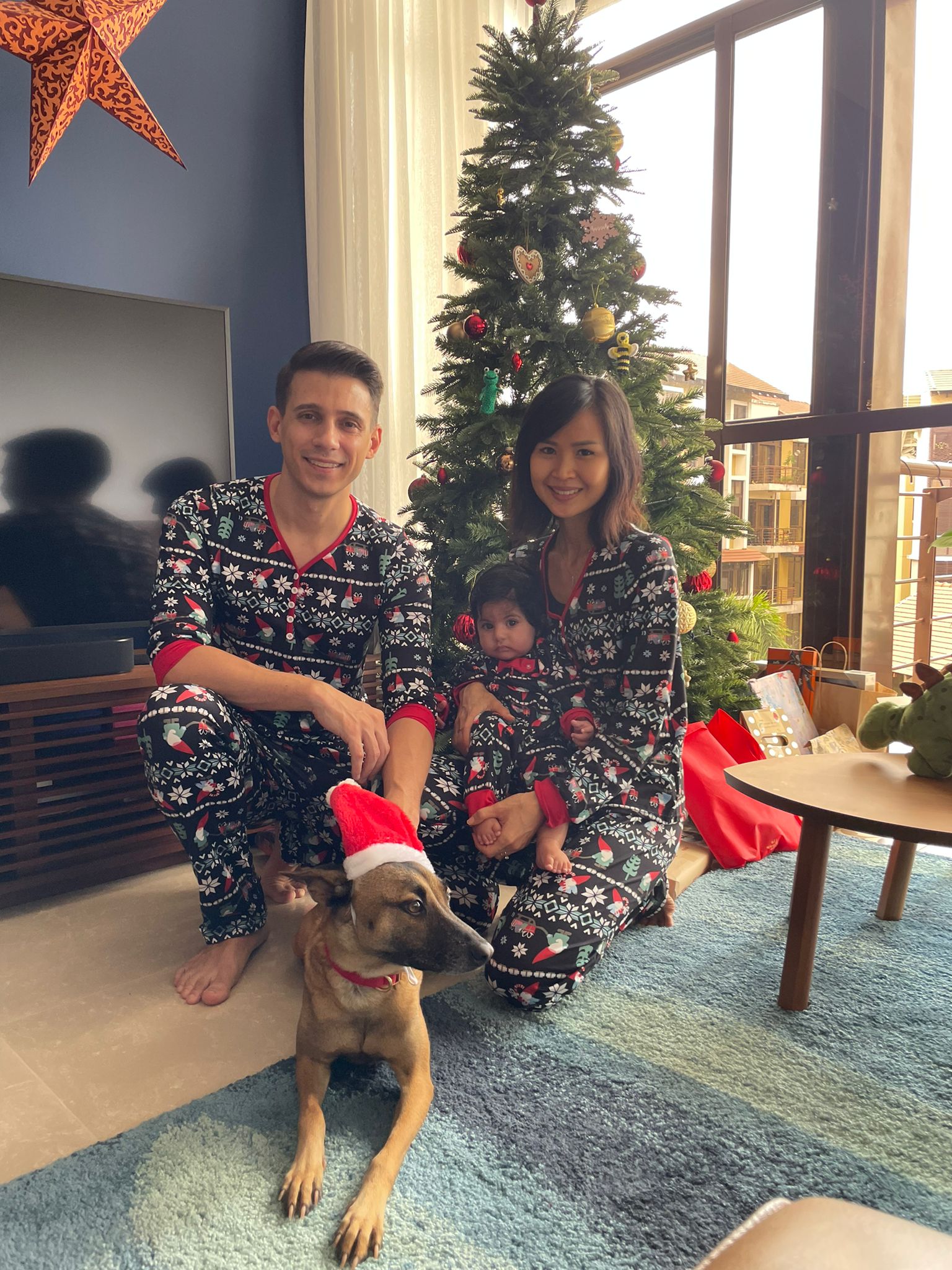
The Rennekamps celebrating their first Christmas as parents in December 2021.
“When we go to her first thing in the morning, she smiles at us. When we put her down to bed, she rolls over and just sleeps. She does a full 12 hours a night.
“She’s very calm. We can put her in a car seat, she will babble to herself. She will watch people and other babies. She is very observant, very determined.”
Already, they have told Hannah that she is adopted. Her birth parents sent her a photo of themselves, which Natalie cherishes because Hannah would be able to see how much they loved her, too.
Now a stay-home mum, Natalie said that motherhood has given her a perspective of God the Father she never had before.
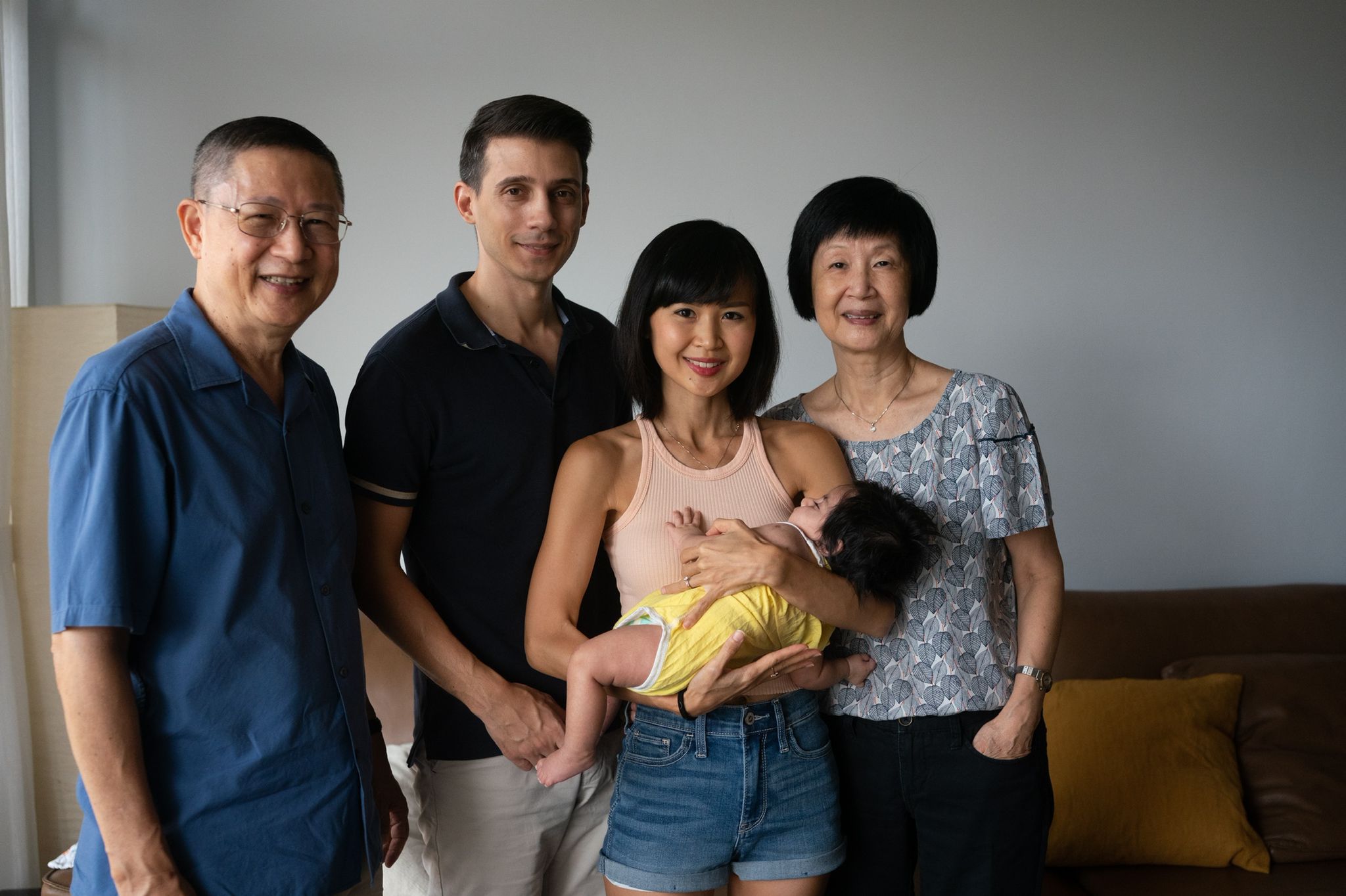
Natalie and Hannah with Natalie’s parents and daddy Florian.
“When I tell her ‘no’, she doesn’t understand why. I can explain to her but she will still look at me and smile and be like, ‘I still want to do it.’
“It is like me. I might never understand why God tells me ‘no’ or why something I love so much is taken away. He may explain but I may not understand.
“But He is trying to protect us, to give us something better or to teach us something. I understand that more now, from having Hannah.”
“Our babies in heaven will always be our babies.”
Meanwhile, Natalie is not letting her experience with pregnancy loss and grief go to waste. She started an Instagram account to share her story of loss, adoption and motherhood.
Having gone through counselling to deal with her grief, she is also pursuing an advanced diploma in counselling psychology so she can support women who have experienced pregnancy loss.
“When I was struggling, I couldn’t find a lot of support for women who had gone through pregnancy loss. It wasn’t a topic many people talked about.
“Now, I want to start a support group to let them know they are not alone.”
Through her loss and grief, new hope and new life have come.
“The triplets gave way for Hannah to come into our home. Our babies in heaven will always be our babies. Now, Hannah also has a home.”
RELATED STORIES:
Don’t say “I know how you feel”: Here’s how to be really present for someone who is grieving
We are an independent, non-profit organisation that relies on the generosity of our readers, such as yourself, to continue serving the kingdom. Every dollar donated goes directly back into our editorial coverage.
Would you consider partnering with us in our kingdom work by supporting us financially, either as a one-off donation, or a recurring pledge?
Support Salt&Light


